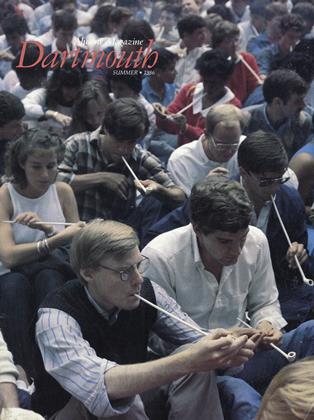Excerpts from the Class Day Address
Associate Professor of English
None of us needs reminding that this has been a difficult year for Dartmouth; perhaps we only need reminding that difficulties may not be all bad. The events of the year that have delighted editors at Time, Newsweek, People, even Rolling Stone have served, if no other purpose, to make all of us ask, with an urgency rarely felt, what is Dartmouth for. And lurking behind that question is the deeper one of what is any education for - and we must sense that the wrong answer has profound consequences not only for the College but for our culture ... Too often we have accepted a conception of education that has neglected to consider deeply what it is for. We've accepted uncritically a conception of education that is little more than instrumental, that contents itself with teaching competencies, with socializing and accrediting. But that can't be the goal of education; it may be a byproduct, but the goal must be some- thing larger, something more generous and humane, something more courageous and tough-minded, something that will remind us of what we don't know and insist that we strive to know it, something that will provide a context for what we do know and will tell us how to use it. But we've never quite been able to match our commitment to information with an equal commitment to knowledge, the commitment to facts with an equal commitment to truth, the commitment to ideas with an equal commitment to ideals. But unless we can, our education is irrelevant, and, worse, dangerous. It makes us arrogant and insensitive. It blinds us to our own fears and weaknesses. It allows us to confuse what we want with what we need. It keeps from, us the essential knowledge of who we are.
The failures of our education are not primarily matters of method or content. We know a lot about the how and about the what. What we don't seem to know is the why . . . We have no clear sense of the aims and the possibilities of education. We have not been able to articulate a coherent and compelling vision of what our education might achieve. And without that sense we become victims of our own nostalgia, of a sentimental longing for a time when that sense was'— or at least seemed clear. But we need something more responsive to the world we live in, and to the world we will live in, and, perhaps most urgently, to the world we could live in ... It is our human resources that we must treasure, that we must nurture and nourish. And Dartmouth is among the places best suited to do this. But too often we have turned away from our responsibilities. We've contented ourself with nurturing and nourishing only what's safe, what's familiar, what validates and replicates what we've always been instead of what we might become.
Dartmouth has always been a spe- cial place a small college with many that love it, and with good reason. But the very things that have made it special have sometimes made it complacent, made us forget what Dewey knew that "a progressive society counts individual variations as precious, since it finds in them the means of its own growth." But too often we have found individual variation to be not a strength of our family but a threat to it. We have valued what fits comfortably into our community, what confirms what we already know instead of what challenges us and forces us to stretch so we learn more about ourselves and our world. We have too often valued fitting-in more than standing-out, ease more than excellence, civility and loyalty more than courage and love . . .
If your education has been worth anything at all it has taught you that you are just beginning a lifetime process of re-examining and re-shaping yourselves so you will be able to meet the challenges of the world you live in. But institutions must remain similarly alive, understanding that their function is not merely to perpetuate themselves but constantly to rediscover their own deepest sources of vitality and purpose. And you must be willing to be part of that rediscovery. We need your intelligence, imagination, and courage. You must become the defenders and shapers of what Dartmouth can be, what Dartmouth must be. You must become a voice that will help us recover and re-affirm a shared sense of purpose which will truly knit us into a family, a purpose that can be found only in a passionate commitment to excellence. That is the "old tradition" that must never be allowed to fail.
 View Full Issue
View Full Issue
More From This Issue
-
 Feature
FeatureYou Laughed
June 1986 By Nancy Wasserman '77 -
 Feature
FeatureCOMMENCEMENT
June 1986 -
 Feature
FeatureReunions 1986
June 1986 By Richard Hovey -
 Article
ArticleErik and Kris Hagerman: A tale of two seniors
June 1986 By Lee McDavid -
 Article
Article"More than Teacher"
June 1986 By Dorothy L. Foley '86 -
 Article
ArticleStephen W. Bosworth '61: Public servant in the spotlight
June 1986 By Robert H. Conn '61
Article
-
 Article
ArticleRECIPIENTS OF HONORARY DEGREES
August, 1925 -
 Article
ArticleCOLLEGE LESS EXPENSIVE MORE BOTHER IN 1855
May 1940 -
 Article
ArticlePresidents of the College
October 1940 -
 Article
ArticleFaculty Articles
April 1960 -
 Article
ArticleTuck School
January 1947 By G. W. Woodworth -
 Article
ArticleEDITORIAL ON CO-OPERATION
JUNE 1932 By R. L. Woodcock '33

